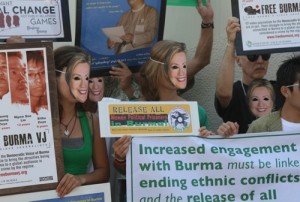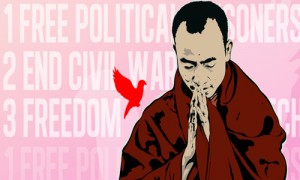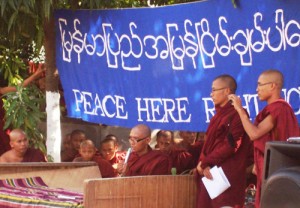Blog (446 found)
Burma’s NHRC: Cheerleader for the Regime
On Saturday, the world celebrated International Human Rights Day. However, in Burma, this anniversary of the adoption of the Universal Declaration on Human Rights marked yet another year without any improvement in the human rights situation of the people.
The newly formed National Human Rights Commission (NHRC) used the occasion to release a statement praising the regime’s commitment to human rights.
In its statement, the NHRC referred to the importance of the International Covenant on Civil and Political Rights and the International Covenant on Economic, Social and Cultural Rights. The NHRC is right these two texts are of high importance. In fact, they are of such importance that, if the NHRC was an independent effective human rights body, it would have surely called on the regime to ratify these two fundamental instruments […]
• • •World Must Act to End Impunity in Burma
By Aung Myo Min
Today as the world celebrates another international human rights day, people in Burma continue to face a host of serious human rights abuses.
Despite minor changes in Naypyidaw, human rights abuses, such as rape, forced labor, killings, torture and forced displacement continue to be committed by Burma Army soldiers in the northeastern part of my country, including Kachin State.
Nevertheless, the international community has overwhelmingly seen the small and reversible changes made by President Thein Sein as real reforms and as a consequence has increased its engagement with the regime […]
• •Clinton’s Historic Trip to Burma Highlights Need for Continued Sanctions
At the beginning of her historical visit to Burma last Wednesday, US Secretary of State Hillary Clinton said, “I came to assess whether the time is right for a new chapter in our shared history.” After a 3-day visit to the country, it seems like the US hopes to use a policy of deeper engagement with Burma as a way to bring more reforms and ensure that the “flickers of change” that President Obama mentioned are fanned “into flames of freedom that light the path toward a better future.” This strategy seems to be shared by Daw Aung San Suu Kyi, who told Clinton, “If we go forward together, I’m confident there will be no turning back from the road to democracy. We are not on that road yet, but we hope to get there as soon as possible with our friends.”
In her press conference when leaving the country, Secretary Clinton said that the regime must do more for the US to start the new chapter of the two countries’ history […]
• • •The Burmans’ Big Brother Complex
By Khin Ohmar
As U.S. Secretary of State Hillary Clinton met with Burma’s leaders this week, she was undoubtedly told that the government was negotiating with armed ethnic groups in the country’s conflict areas as the latest step in Burma’s political transformation. Leaders will try to construe these preliminary discussions as significant steps toward peace agreements.
While such negotiations are welcome, it is important to realize that the issues relating to ethnic minorities in Burma are very complex and cannot be solved overnight, even if new ceasefire agreements are eventually reached. Because of decades of conflict, time and effort will be required to build trust […]
• •Rally in Chiang Mai draws several prominent ethnic activists, international media
 The rally at the U.S. Consulate in Chiang Mai this morning attracted a large crowd, including international media and several prominent ethnic activists.
The rally at the U.S. Consulate in Chiang Mai this morning attracted a large crowd, including international media and several prominent ethnic activists.
Organized by The Best Friend and We Are Burma to coincide with U.S. Secretary of State Hillary Clinton’s visit to Burma, the highest-level diplomatic exchange between the U.S. and Burma in 55 years, the purpose of the rally was to propel ethnic and political prisoner issues to the top of the agenda for all nations increasing engagement with the new regime in Burma […]
Clinton Must Prioritize Release of Political Prisoners and Human Rights Abuses on Visit to Burma
US Secretary of State Hillary Clinton is expected to arrive in Burma this Wednesday, 30 November, for the first visit by an American Secretary of State to the country in more than fifty years. In announcing her visit, US President Barack Obama has focused on positive developments in Burma, referring to “flickers of progress” but he also recognized that “there’s far more to be done” and that the possibility of establishing closer ties between Burma and the United States “will depend upon the Burmese government taking more concrete action.”
While many have welcomed the visit by Secretary Clinton, it is crucial that during her time in Burma, she prioritize putting pressure on the regime to bring an end to the decades of human rights abuses perpetrated against civilians throughout the country. Despite the “flickers of progress” that President Obama highlighted in his speech, the reality is that in many ways human rights abuses have escalated since President Thein Sein took office […]
• • •Naypyidaw’s Lies and Disinformation Illustrate Lack of Willingness to Make Real Change
This week, Naypyidaw’s public relations games reached a new low with Information Minister Kyaw Hsan’s interview in the Wall Street Journal. For the first time in years, a regime official met with a major Western news organisation in a three-hour-long interview only two days before the opening of the 19th ASEAN Summit in Bali, Indonesia, where the bloc was to decide on Burma’s bid for the chairmanship in 2014. Kyaw Hsan’s interview was a last attempt at charming ASEAN member states and strategic partners. The regime’s disinformation campaign paid off with ASEAN ultimately making the decision to grant Burma the Chair, the EU welcoming positive moves in the country in an official statement, and US President Barack Obama announcing the first visit to the country in 50 years of an American Secretary of State.
However, a simple glance at this week’s interview is enough to see through the military-led government’s public relations campaign and realize that the regime under President Thein Sein is not ready for genuine change […]
• • •Mandalay Peace Protest – Sangha under pressure
 Since yesterday we have been unable to contact any of the five monks who led the peaceful protest in Mandalay calling for the release of political prisoners and an end to the civil wars in Burma.
Since yesterday we have been unable to contact any of the five monks who led the peaceful protest in Mandalay calling for the release of political prisoners and an end to the civil wars in Burma.
The last information that we could confirm was that the five monks had been ordered to return to their hometowns with transportation arranged by the authorities this afternoon (Friday 18 November). Two local journalists today confirmed with us that all five monks arrived in Monywa in Sagaing Division. However, the local Sangha decided not to allow them to stay at local monasteries, possibly fearing repercussions from the authorities […]
Mandalay Peace Protest – Police have surrounded the monastery
 On Wednesday the senior monks requested that they once again move, this time to the Old Masoeyein Monastery. After the first public speech, which was attended by around 1200 listeners, the senior monks told Ashin Sopaka and his friends that they could not give them permission to speak any more and that they now would have to move again, this time to the smaller “Water Monastery” near Mahamuni Paya.
On Wednesday the senior monks requested that they once again move, this time to the Old Masoeyein Monastery. After the first public speech, which was attended by around 1200 listeners, the senior monks told Ashin Sopaka and his friends that they could not give them permission to speak any more and that they now would have to move again, this time to the smaller “Water Monastery” near Mahamuni Paya.
They have permission to stay at the “Water Monastery” for only one night. On Thursday they have to move to another place. Which place that will be is still unclear. The monastery compound has since been blocked by police. No civilians are allowed to enter and talk with the monks […]
We call on all monks, people of Burma and people outside of Burma to join Ashin Sopaka
In the past several months people around the world have been asking us “Where is Ashin Sopaka?” Now everyone knows.
On 15 November at 5 a.m., Ashin Sopaka and four other Buddhist monks locked themselves in a building on the compound of Mahamuni Paya, which is one of the most revered places in Burma. They unfurled banners in English and Burmese reading: “We want freedom”, “Free all political prisoners”, and “Stop civil war now”.
This is the first public protest by monks since the mass demonstrations in 2007 […]
• • •








 All posts
All posts